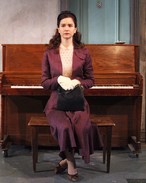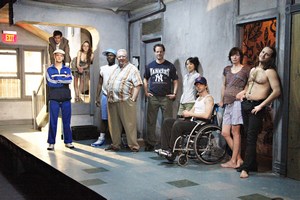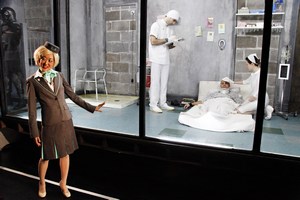SITE GUIDE
SEARCH
REVIEWS
REVIEW ARCHIVES
ADVERTISING AT CURTAINUP
FEATURES
NEWS
Etcetera and
Short Term Listings
LISTINGS
Broadway
Off-Broadway
NYC Restaurants
BOOKS and CDs
OTHER PLACES
Berkshires
London
California
New Jersey
DC
Connecticut
Philadelphia
Elsewhere
QUOTES
TKTS
PLAYWRIGHTS' ALBUMS
LETTERS TO EDITOR
FILM
LINKS
MISCELLANEOUS
Free Updates
Masthead
A CurtainUp Review
The Hallway Trilogy
By Elyse Sommer
Play by Play reviews of The Hallway Trilogy-: Rose - #1 | Paraffin - #2 | Nursing - #3 |
|
3 Free Standing Plays That Span 100 Years and 4 1/2 Hours. Adam Rapp Wraps It All Up As The Hallway Trilogy Considering the venue that the Rattlestick calls home, Rapp's vision for staging his triptych was quite a challenge both economically and physically. Fourteen actors are more than you're apt to see on any stage, and while not all fourteen appear in all three plays, all are double cast. As for the physical challenge, while there's not a lot of scenery, the long hallway which gave the trilogy its umbrella title demanded a complete rejiggering of the theater. The stage now runs from what used to be the end of the playing area to the theater's entryway. The seats for the audience now consist of three, long rows, staggered stadium style and facing that very wide stage. New York theater goers seem to love trilogies, especially when available in repertory to be seen in succeeding days, or weeks -- or all in one swoop. Tom Stoppard's epic Coast of Utopia was the theatrical event of the 2002 season. . . three seasons ago the marathon performances of Alan Ayckbourn's The Norman Conquests were the most popular. . . When Michael Wilson created a 3-part series of trilogies from nine of Horton Foote's one-act plays with an all embracing title of The Orphans Home Cycle the result led to extension after extension and most people went to see all three parts. Given the popularity of trilogies and Adam Rapp's large fan base, my guess is that this world premiere of not one but three new plays by him will be quite a downtown event and that most people will want to catch all three plays, with many opting for the all-in-one performances. Still, the plays are billed as full-length plays, a fact underscored by each having a different director, while the trilogy label is supported by their having a single design team and the multi-tasking acting ensemble. Even the all-in-one marathon days establish the plays as independent units with a lunch and long dinner break; in other words, each stands on its own though the thematic, casting and staging connections make seeing the complete trilogy more than tempting. To help clarify my feelings about how well these plays work separately and as a unit, I decided to see the first two plays in one day and go back a week later for the third, thus combining the marathon and stand-alone experience. I also felt that the week in between would work as a sort of counterpoint to the way the plays have been structure to move forward in time — Rose takes place in 1953, Paraffin in 2003, and Nursing in 2053). The production notes that follow are for the entire trilogy. The Hallway Trilogy by Adam Rapp Rose directed by Adam Rapp Parafin directed by Daniel Aukin Nursing directed by Trip Cullman Cast: William Apps (Orest/Denny), Robert Beitzel (Ido/Joe), Guy Boyd (O'Neil/Marty), Louis Cancelmi (Jerry, Andy), Maria Dizzia (Rahel/Joan), Logan Marshall-Green (Richard B/Lloyd), Sue Jean Kim (Dena/Tour Guide), Nick Lawson (Marbles/Leshik), Sarah Lemp (Megan/Erin), Danny Mastrogiorgio (Louie Zap/Kevin), Julianne Nicholson (Mary/Margot), Jeremy Strong (Lucas/ Journalist), Katherine Waterston (Rose),Stephen Tyrone Williams (Cory/Guard) Set design: Beowulf Boritt Costume design: Jessica Pabst Lighting design: Tyler Micoleau Music and sound design: Erick Shimelonis Hair and Makeup: Erin Kennedy Lunsford Props: Eugenia Furneaux-Arends Special Effects: Jeremy Chernick Fight Choreographer: Thomas Schall Stage Managers: Melissa Mae Gregus, Meredith Dixon Running Time: 90 minutes each play, without an intermission Rattlestick Playwrights Theater 224 Waverly Place 212/868-4444 From 2/06/11; Rose opening 2/22; Paraffin opening 2/23; Nursing opening 2/24; all closing 3/27/11 Performance schedule: Rose -- Tuesdays @ 8pm; Paraffin -- Wednesdays @ 8pm; Nursing --Thursdays @ 8pm; Plays 1, 2, 3 will run in rotating repertory on Fidays at 8pm, Saturdays at 4pm and 8pm. Sunday marathons: 1pm, 4pm, 8pm. Tickets: $99 for all 3 plays; $55 single play tickets Review by Elyse Sommer based February 20th 1pm and 4pm ; and February 26th 4pm |
Rose
|
A great theatrical work can change you, it really can — Rose When it's good there's nothing like it. — Jerry I wish my husband felt this way. . .he thinks theater is an inconsequential entertainment. To him Eugene O'Neill and Tennessee Williams are no different than Red Skelton or the Rockettes.— Rose |

Katherine Waterston as the title character in the first play of The Hallway Trilogy
(Photo: Sandra Coudert) |
But O'Neill's influence in this play goes far deeper. The playwright was sympathetic and friendly with Communists long before the anti-communist sentiments that prevail in 1953. Rose, who once met the playwright and seems convinced that the Super's apartment is his incognito hideout would fit right in with some of the characters in The Iceman Cometh. So would some of the other characters she encounters. Furthermore, the audition scene she hopes to do for O'Neill is from Desire Under the Elms and serves as an ominous symbol of how life in this play may end up imitating life in O'Neill's play. This heavy flavoring of O'Neill, plus dashes of Tennessee Williams and Thornton Wilder, gives Rose an almost old-fashioned flavor that's decidedly different for a playwright known for a more now and out there sensibility.
Beowulf Boritt's stark gray third-story hallway, its only props a wall phone and a somewhat mysterious upright piano, is grunge perfection. With its glimpses into apartments whenever doors are opened and Tyler Micoleau's mood supporting lighting, we are aware of the claustrophobic lives of the characters even before we meet them.
The hopeful and despairing tenants we get to know include a very real O'Neill, the unlikeable superintendent (Guy Boyd) who is not averse to changing locks and confiscating property when rents are not paid in time. Some of these luckless tenants include two sisters who live on the fourth floor — Mary (Julianne Nicholson), a pretty redhead whose planned marriage to a rich older man ended with a headline-making scandal instead of wedding bells. Mary's older sister Megan (Sarah Lemp), a lonely World War II widow with a hankering for Orest (William Apps), a Russian immigrant who is less interested in her than in some day becoming another Louis Armstrong. While Orest's passion for Armstrong seems sincere, his constant and passionate declarations of love for all things American are probably partly motivated by fear of being deported as a communist during this "red scare" period.
Another tenant who plays a key role is Jerry (Louis Cancelmi). He tells Rose that he works at a menial job in the subways by choice even though he's a Princeton graduate. To Rose's delight he also likes the theater and belongs to an artsy political group. If Jerry weren't mad about the red-headed Mary, he might be a romantic interest for Rose — that is if she weren't married and living in Darien, Connecticut with her high school sweetheart Richard (Logan Marshall Green). Unlike Eugene O'Neill, the husband, an insurance salesman, does make an appearance, though he doesn't clarify the script's one plot hole, what Hitchcock called the inevitable icebox moment: why in the world would Met Life transfer a man from Wisconsin to New York for a lowly door-to-door job?.
The shadow of The Iceman Cometh hangs over this hallway scenario so much that at times Rose feels a bit like an O'Neill homage. Yet this is not a copycat play. Rapp has also added absurdist touch via a fantastical mischief maker named Marbles (Nick Lawson) and a vaguely menacing Pinterish outsider named Louie Zap (Danny Mastrorgiorgio). Ominous too is the apartment that has stood empty since its last tenant hanged himself during the Great Depression. Some of the tenants refer to him as a ghost but the real ghosts in this play are the unfulfilled dreams of the living.
While Rose is more tragedy than comedy, there are plenty of laughs. Mr. Rapp, in his role as the director, has guided the actors to bring out their characters' lighter and darker sides. Katherine Waterston's brings a wonderful delicacy to Rose. Louis Canselmi handles his complex character with great skill. Some of the best funny business is provided by William Apps who, as the Russian immigrant Orest, zestfully and hilariously butchers his adopted land's language. Every one of the nine actors who gather for the curtain call richly deserve their applause.
I left Rose eager to see some of these actors take on different roles as the trilogy jumps forward fifty years to another evening.
Paraffin - Play 2

The cast of Paraffin -- On stairway: Maria Dizzia and Robert Beitzel. Left to right: Nick Lawson, Stephen Tyrone Williams, Guy Boyd (Katherine Waterston in back of Boyd), Danny Mastrogiorgio, Jeremy Strong, Julianne Nicholson and William Apps. (Photo: Sandra Coudert)
|
|
Lucas, you'll have to forgive me if this comes off as half-baked wisdom from an
old queen whom you undoubtedly detest, but I happen to think there's still some good in you. Despite your bitterness, despite your capacity for smallness and cruelty, whether you like it or not, there's still something alive in that faulty body of yours, and I'd bet my favorite hat that it's your heart. But until you start living your life like you possess that vital muscle, you're going to be stuck in a dark place for a very long time.— Marty, to the wheelchair bound Afghanistan veteran who's this play' s most fully developed character. Please also tell to Margo Kellen to tell to Denny Kellen that if he does not meet Balboa at disgust location at disgust time with disgust amount of money that he will be hunted like wild boar and stabbed many times with screwdriver — Leshik. This is just a tiny excerpt from a message the Polish gangster asks Dena to pass on to her friend whose junkie husband is heavily in debt his boss. Leshik's threats are as funny as they are chilling thanks to his convoluted English. |
The actors are again outstanding. Too bad that the same can't be said for Paraffin. Rapp's setup of substituting the third floor hallway of a dingy walkup apartment house instead of a dimly lit bar to unspool the stories of a big city's flotsam and jestsam still works. There are patches of almost poetic dialogue to illustrate Rapp's talent as a writer, not to mention his flair with mining foreign accents for humor. But while Rose wasn't light, escapist fare, it was moving and engaging, whereas Paraffin unfortunately reverts to the relentlessly downbeat and over-indulgently V& V mode (Violence and Vulgarity ) of Faster, a 2002 Rapp-Rattlestick collaboration.
The threads that connect the two plays besides the setting include talk of a ghost haunting the building, an unrequited passion of one tenant for another, and the overarching menace portending a tragic ending. As Rose revolved around the mistaken identity twist that led the wannabe young actress to seek out the building superintendent, so Paraffin focuses on the less unusual as well as less compelling situation of a troubled marriage (Julianne Nicholson as Margot and William Apps as Denny) — a marital triangle, if you add the heroin addicted musician husband's wheelchair bound brother Lucas (Jeremy Strong) who's angry about everything and at everyone, except his sister-in-law.
Nicholson, the tramp-y Mary in Rose makes the most of the larger role of the wife whose loyalty to her husband is stretched to the limits by what his addiction has done to their lives. Apps, who was so amusing as the English-destroying Orest is anything but funny as the worthless husband, a man from a prosperous Heartland family whose drug habit has turned him into a dishevelled thief. (Could this family be Rapp's symbol for America's decline ?) It's Denny who is the cause for the sign warning theater goers to expect nudity and the sound of gun shots. Besides nudity, Denny also supplies an especially unpalatable touch of gritty realism by making us privvy to his inability to control his bodily functions.
Jeremy Strong has the most fully developed role as the embittered Lucas. Marty (Guy Boyd), the unpleasant Super from Rose who's now a gentle, lonely homosexual in whose apartment Lucas's parents have rented a room for him, is right in telling him that there's still some good beneath all his display of "smallness and cruelty." But Rapp makes it hard to relate to redemptive possibilities by tipping the scales in favor of Lucas's nastiness, and saddling him with a silly bit of in your face business similar to what our review of Faster referred to as seemingly borrowed from Puppetry of the Penis. This needless showing off (literally) is part of a run- in with an Israeli couple (Maria Dizzia as Rahel and Robert Beitzel as Ido) who are too underdeveloped to add anything memorable or substantial.
Paraffin does have its high spots, the best scene being an interchange between Leshik (Nick Larson, the mischieveous Marbles of Rose), the Polish gangster and Margo's friend Dena (Sue Jean Kim). Larson makes this lengthy description of what Margo can expect his gangster boss to do to Denny as funny as it is chilling. Kim, is wonderfully dead pan as the messenger who is supposed to relay these threats to her friend. The problem is that though Dena has no difficulty remembering every word of that lengthy message, there's no clarification about t why she fails to do more than urge Margo to change the apartment's lock. This isn't the only plot hole. It's hard to understand why Lucas's parents would rent a room for their crippled son in a third floor walk-up where he couldn't possibly take advantage of the summer in New York they want him to experience.
As for the blackout, the electricity does go out and director Daniel Aukin ably handles the long scene when we only see the actors as lit by the candles which give the play its title (paraffin = a substance used in candles, for forming preservative coatings and seal). The good performances and evocative set notwithstanding, I left the theater hoping that the futuristic Nursing would be intriguing enough to overshadow Paraffin's weaknesses.
Nursing - Play 3

Sue Jean Kimas the tour guide in the tenement house turned futristic museum of the final play of The Hallway Trlogy. At the rear: : Louis Cancelmi, Logan Marshall-Green and Maria Dizzia. (Photo: Sandra Coudert).
|
|
But what the heck do you do all day? — Joe What do you mean, what do I do? I get to lie around and be cared for. Iím like a really expressive houseplant.—Lloyd Not my idea of a useful life, Lloyd.— Joe Not all lives are useful ones, Joseph.— Lloyd The shame is that youíre squandering yours.—Joe This exchange is between Lloyd, the volunteer human museum exhibit and his visiting brother Joe who is living a more normal life, as an Arizona family man and prosperous head of a feel good pill manufacturing company —a life nevertheless threatened by environmental problems which are as yet unconquered, unlike the diseases now museum exhibits. |
The play is once again blessed by a fine ensemble and an able director. While there's no need to have seen Rose or Paraffin to follow the grisly story, there are similitarities (Both Paraffin and Nursing feature two very different brothers) and it's intriguing to see actors who had small roles previously have more of a chance to strut their talents here. This is especially true of Logan Marshall-Green who appeared briefly at the end of Rose but now is the leading and almost always on stage character — a cynical man haunted by guilt over his actions in an endless Afghanistan war who has volunteered to be the demonstration model of the pain once endured from now cured killer diseases. It means being injected with one disease, brought back to life, only to have the process repeated for another horrendous round of suffering. Marshall-Green's performance is a true knockout. If only the play itself were on a par with it.
Unfortunately, even the tour-de-force lead actor and the expert support players can't make Rapp's futuristic world credible or all that interesting. A young lady sitting next to me who liked the first two plays, missed much of Nursing as she covered her eyes or put down her head during the frequent extreme images and sounds of agonizing pain from vomiting and diarrhea. Clearly Nursing's V & V elements (vulgarity and violence) out-do Paraffin's scatological excess.
While Nursing did bear out the billing of these three scenery and ensemble sharing plays as full-length, free standing plays, it was disappointing as a solidly connected trilogy. There was some fine sensitive and funny writing, especially in the first two plays and Beowulf Boritt's hallway is brilliantly designed. Unlike Rapp, whose plots tend to have glaringly faulty or missing details, the designer overlooked no opportunity to show that hallway as an evolving organism. There were subtle touches to indicate changes wrought during the 50 years between Rose and Paraffin, and just enough of the original hallway in the redesigned futuristic finale. It's too bad that the plays overall just don't allow that hallway to be much more than device.
While The Hallway Trilogy doesn't add up to quite as special and memorable an event as promised, this is an ambitious undertaking for Rapp, his co-directors and the actors — and probably most of all for the folks at the Rattlestick Playwrights Theater.
|
REVIEW FEEDBACK Highlight one of the responses below and click "copy" or"CTRL+C"
Paste the highlighted text into the subject line (CTRL+ V): Feel free to add detailed comments in the body of the email. . .also the names and emails of any friends to whom you'd like us to forward a copy of this review. Visit Curtainup's Blog Annex For a feed to reviews and features as they are posted add http://curtainupnewlinks.blogspot.com to your reader Curtainup at Facebook . . . Curtainup at Twitter Subscribe to our FREE email updates: E-mail: esommer@curtainup.comesommer@curtainup.com put SUBSCRIBE CURTAINUP EMAIL UPDATE in the subject line and your full name and email address in the body of the message. If you can spare a minute, tell us how you came to CurtainUp and from what part of the country. |

Slings & Arrows-the complete set
You don't have to be a Shakespeare aficionado to love all 21 episodes of this hilarious and moving Canadian TV series about a fictional Shakespeare Company






